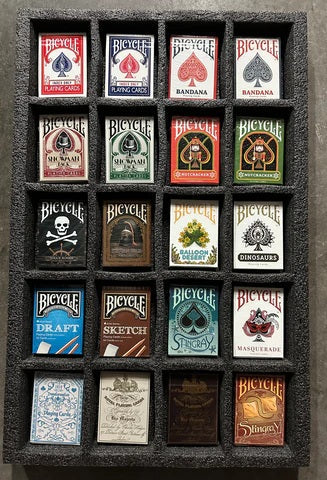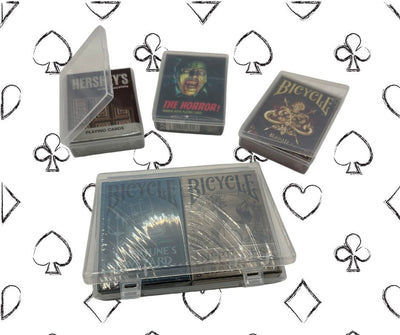(Above is a depiction of a 17th century game of Piquet, made by Jean-Louis-Ernest Meissonier)
Card Game Rules
Piquet, or P. K., is a historic trick taking game for two players. Piquet requires a 32 playing card deck, with 7s (low) to Aces (high). The objective of Piquet is to win points through sets, sequences, and winning tricks.
If you are looking for cards to play Piquet with, check out a standard deck here or check out one of our recent arrivals here.
For more trick taking games, check out our guides for Whist and Euchre.
Set-up
Before gameplay can begin, a dealer must be selected. To do so, players must choose a random card from a shuffled deck. The player with the lowest card becomes the dealer. Ties are broken with repeated drawings. The dealer shuffles the deck and then passes out, faced down, twelve cards in sets of three to each player. The remaining eight cards form the stock pile.
Card Exchange
The non-dealer can choose to exchange up to five of their cards for cards in the stock. The dealer then can choose to exchange their cards up to the remaining amount of cards left in the stock.
If a player has an entire hand with no face cards before the card exchange, this is called a carte blanche and they win 10 points.
Card Values
The following is the card values for the game Piquet:
Aces are worth 11 points.
10s through Kings are worth 10 points.
7s through 9s are worth their face values.
How to Play
Phase 1: Suits, Sequences, and Sets
Phase 1 of the game involves getting points based on certain combinations in a player's hand. The non-dealer is first to declare the highest number of cards they have in the same suit. If the dealer can beat that, they say "No Good", if they can't, they say "Good", and if they have the same number of cards in a suit, they say "Equal". The player with the highest number of cards in the suit, wins that many points. If both players have the same number of cards, then the winner is determined by the card's point value.
After suits are determined, the non-dealer declares how many cards they have in a sequence. A sequence must be one of three cards or more. The winner is determined in the same way as the suits. If the winner has a sequence of five or more, they earn an additional 10 points.
After Sequences are determined, the non-dealer declares how many cards of a kind they have. A set must be of three or four to be declared. The winner of Sets wins 3 points for a set of three and 14 points for a set of four.
Phase 2: Trick Taking
After phase 1 is completed, Piquet becomes a classic trick taking game. The non-dealer leads the first trick. The lead suit is trump for the trick and players must follow if they can. The winner of the trick leads the next trick.
In the trick taking phase, players win:
1 point for leading a trick
1 point for winning a trick that was lead by their opponent
1 point for taking the last trick
10 points for taking the most tricks
40 points for taking all of the tricks
After all of the tricks have been taken and the scores calculated, the cards are shuffled, the dealer position rotates, and a new round begins. The player with the most points after six rounds wins.
For more information about the game Piquet, check out David Parlett's article here or Pagat.com's article here.
Looking for more card games to play? Check out this article:
40+ Great Card Games For All Occasions
About the author: John Taylor is a content writer and freelancer through the company Upwork.com. You may view his freelancing profile here. He has a B. A. in English, with a specialty in technical writing, from Texas A&M University and a M. A. in English from the University of Glasgow. You may view his previous articles about card games here and his LinkedIn profile here.







1 comment
Dear Sir,
Your rule set for Piquet requires attention as you suggest the Younger player/non dealer instigates declarations before the Dealer and indeed trick taking too. All historical texts other than yours indicate the opposite. For a better understanding of the rule set see the Historian David Parlet’s website who has transcribed the 19th Century description by Cavendish in a more simpler English.